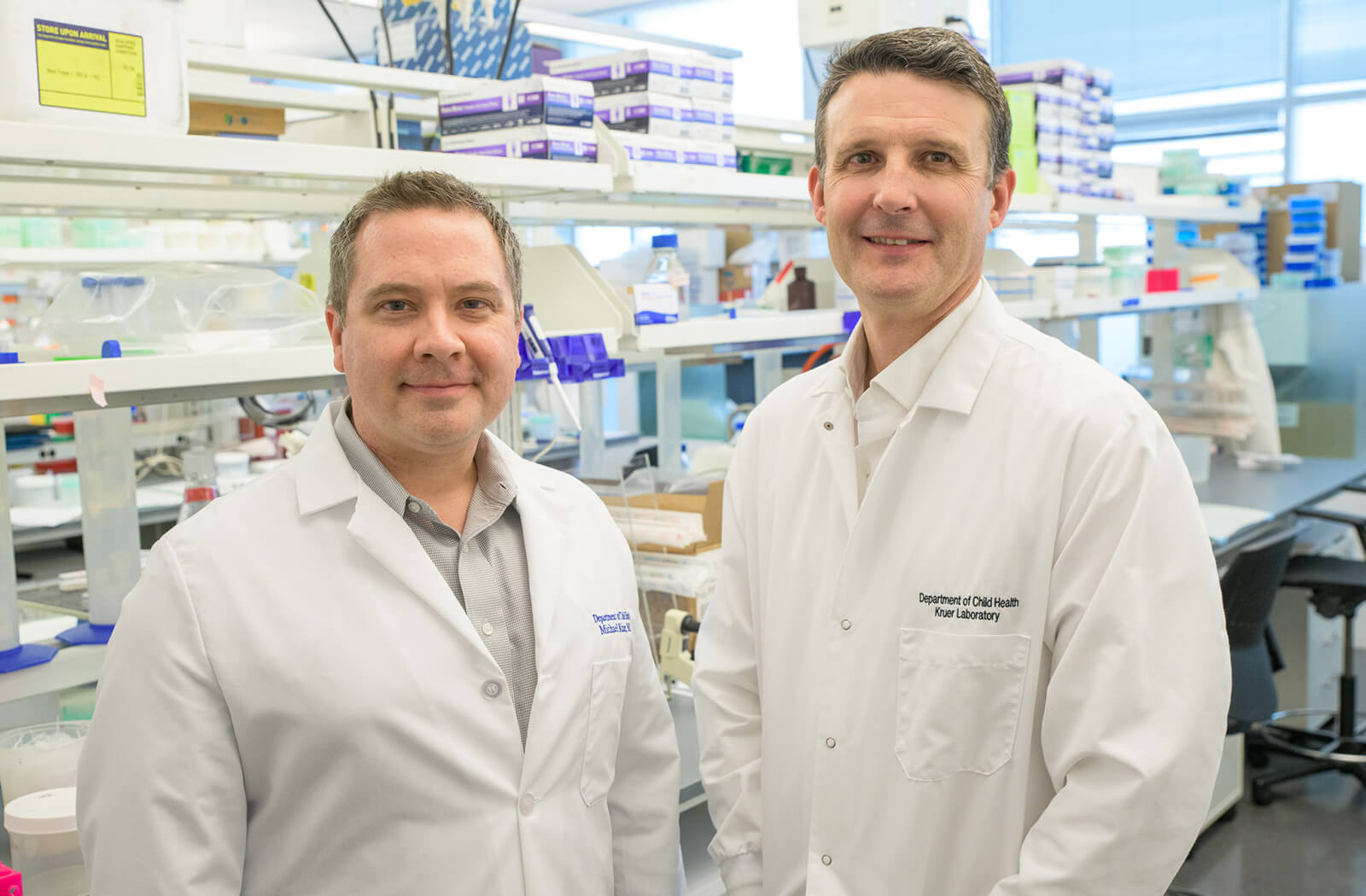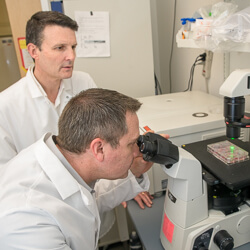
Fulbright Fellow Works with UA Researchers to Improve Understanding, Treatments for Cerebral Palsy

Renowned physician-scientist Michael Fahey, MD, PhD, has spent the past three months at the University of Arizona College of Medicine – Phoenix as a Fulbright Fellow, where he has cultivated relationships with institutions throughout the U.S. to advance the work and understanding of cerebral palsy and genetics.
Dr. Fahey, an associate professor at Monash University’s School of Clinical Sciences at Monash Health and head of the Paediatric Neurology Unit at Monash Children’s Hospital in Melbourne, Australia, was awarded a prestigious Fulbright Scholarship to work with Michael Kruer, MD, an associate professor of neurology and child health at the College of Medicine – Phoenix, and an international expert on cerebral palsy in his own right.
“Most scholarships you look at are about personal glory,” Dr. Fahey said. “The Fulbright Program is about being together and working as a team on a project. It is about making the world a better place and doing something that generates a better outcome.”
Dr. Fahey worked in Dr. Kruer’s laboratory, integrating phenomic, genomic and model organism data. He also saw patients with genetic forms of cerebral palsy at Phoenix Children’s Hospital with Dr. Kruer, who is director of the Cerebral Palsy and Pediatric Movement Disorders Program at Barrow Neurological Institute at Phoenix Children’s Hospital. The two are working to combine cutting-edge neuroimaging data from the Australian Commonwealth Scientific and Industrial Research Organization with contemporary genomic techniques to better understand complex neurological diseases.

Although most of his time was spent in Phoenix, Dr. Fahey traveled to various institutions across the U.S. to spearhead collaborations, including Johns Hopkins University, Columbia University, the University of Utah, Nationwide Children’s Hospital and the National Institutes of Health.
“This has been a wonderful experience,” Dr. Fahey said. “I felt welcomed instantly by Dr. Kruer and the community. It has been remarkable to not only have access to the labs in Phoenix, but to be welcomed by other institutions, as well. The way everyone has welcomed me has surpassed my expectations.”
Dr. Fahey said collaboration and data sharing are critical for advancing patient care in cerebral palsy and genomics, which could lead to a better understanding of cerebral palsy including possible therapies. The partnerships Dr. Fahey built during his stay were not just for his benefit. He helped create collaborations with American and international institutions that all researchers involved can utilize. The collaborations are occurring under the umbrella of the International Cerebral Palsy Genomics Consortium, chaired by Dr. Kruer.
“If you analyze one or two patients, you get interesting results,” Dr. Fahey said. “When you analyze a few thousand patients, all of a sudden you start to really unravel the story. We want to bring as many people to the party as possible in the hopes that we discover answers as they relates to genetic results.”
The flagship foreign exchange scholarship program of the U.S., the Fulbright Program increases binational research collaboration and the exchange of ideas. Dr. Fahey traveled to Phoenix in November 2019 with his family and returned to Australia in mid-February.
“Typically in academics, in order to win, someone has to lose something,” Dr. Fahey said. “With the Fulbright Program, it’s a win-win. All parties are better off as a result. I enjoyed meeting with people and trying to generate these win-wins in the field. Although, the most important win from this will hopefully be our patients.”
About the College
Founded in 2007, the University of Arizona College of Medicine – Phoenix inspires and trains exemplary physicians, scientists and leaders to advance its core missions in education, research, clinical care and service to communities across Arizona. The college’s strength lies in our collaborations and partnerships with clinical affiliates, community organizations and industry sponsors. With our primary affiliate, Banner Health, we are recognized as the premier academic medical center in Phoenix. As an anchor institution of the Phoenix Bioscience Core, the college is home to signature research programs in neurosciences, cardiopulmonary diseases, immunology, informatics and metabolism. These focus areas uniquely position us to drive biomedical research and bolster economic development in the region.
As an urban institution with strong roots in rural and tribal health, the college has graduated more than 1,000 physicians and matriculates 130 students each year. Greater than 60% of matriculating students are from Arizona and many continue training at our GME sponsored residency programs, ultimately pursuing local academic and community-based opportunities. While our traditional four-year program continues to thrive, we will launch our recently approved accelerated three-year medical student curriculum with exclusive focus on primary care. This program is designed to further enhance workforce retention needs across Arizona.
The college has embarked on our strategic plan for 2025 to 2030. Learn more.